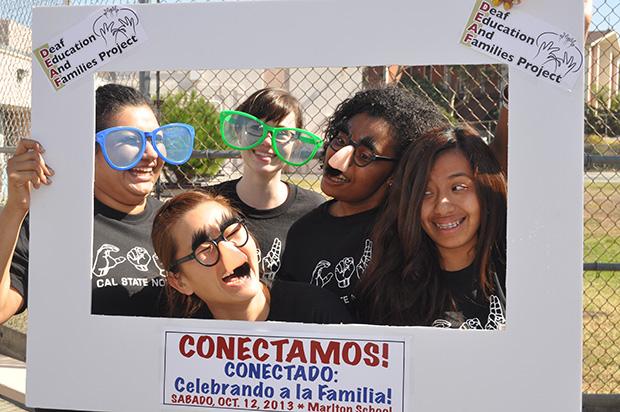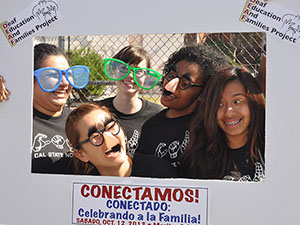
>>> CORRECTION: In the story, “Deaf retreat improves communication,” which ran on Oct. 14, the DEAF Project coordinator’s name is Rachel Friedman Narr. Also, the event was held for the parents of deaf and hard-of-hearing children ages 3 to 17. The DEAF Project, not the DEAF project or the DEAF retreat, was an effort to connect families raising deaf and hard-of-hearing children and to allow them to attend various workshops.
The DEAF Project retreat connected families with deaf and hard-of-hearing children at the Marlton School in Los Angeles Saturday afternoon.
The goal of the retreat was to build hearing, hard-of-hearing and deaf family communication skills by providing workshops and family team building activities.
Apryl Chauhan has been involved with the DEAF project since they started, first as a mother receiving help and now contributing to the program as a presenter because she said the events the DEAF Project team hosts can make a difference in the lives of blended families.
“The social events are what have impacted my life the most,” Chauhan said. “[By] giving us all an opportunity to come together and enjoy each other as a family.”
The retreat was conducted in English, Spanish and American Sign Language (ASL) to make sure that every possible person in attendance was accommodated and made to feel comfortable.
“About 30 percent of the families that we work with are Spanish speaking and we are targeting everybody,” said DEAF project coordinator Rachel Freeman Narr. “We want to make sure that they are feeling welcomed and invited because locating resources is really challenging for families that are already feeling isolated.”
Some of the resources provided by the DEAF Project team include ASL courses and mental health resources for deaf and hard-of-hearing family members.
The DEAF Project has been at CSUN since 2007 under the Family Focus Resource Center in the College of Education with the purpose of providing support and empowerment for parents of deaf and hard-of-hearing children.
“What that looks like are activities, education, networking, getting these families together so they can meet one another [so their kids can meet one another] so that they can feel less alone out there in the world,” Freeman Narr said.
The DEAF project serves 12 counties from southern California including Kern County, San Luis Obispo, all the way down to Mexico and over to Arizona.
“We are very pleased that a lot of families have traveled pretty far, we have a family from Indio, from Bakersfield, San Bernardino, San Diego, Ventura, Lancaster, so we are really happy with the turnout,” said Freeman Naar after seeing more than 230 people (about 50 families) at the retreat.
Parents were divided into two different groups with only moms and dads. These groups were then divided again into English and Spanish speaking. Once in their groups, hearing parents were asked to wear earplugs in order to better understand for a few moments how it feels to be deaf or hard-of-hearing. Presenters talked about the importance of interacting with children, programs available for them, and other ways to communicate with deaf and hard-of-hearing kids to show emotions.
Marcus Rayon, 30, has a hard-of-hearing son and said this retreat was very unique and beneficial for him.
“It was very fulfilling because everybody got to share what kind of father you want to be and what kind of legacy you want to leave and that is so important in being a father,” Rayon said.
He also said that something he learned and impacted him as a busy father was a message he heard at the retreat. “You (have to) not be so busy making a living and start being busy making a life,” Rayon said.
Doctor Tomas Garcia, who is deaf and specializes in American Sign Language education also believes events of this type are important for the deaf community.
“There is a lot of social pressures to be categorized and to fit into a box. What happens a lot of times is that those deaf children go through the same experience that I did in not knowing and not distinguishing their identity,” Garcia said.
He said that by going out into the community, by talking, interacting and living the experience together children feel part of a community.
Freeman Narr said these events are also about helping parents raising deaf and hard-of-hearing children, for parents to meet deaf adults, to “meet their children in the future.”
Doctor Garcia said he wants parents to see him as the future of their children.
“I am in representation of your child, this is your child having grown up … so I’m directly sharing challenges and successes with you so we can be stronger and united” Garcia said.
This is the first retreat of this type hosted by the DEAF project but they have other similar events every month.






